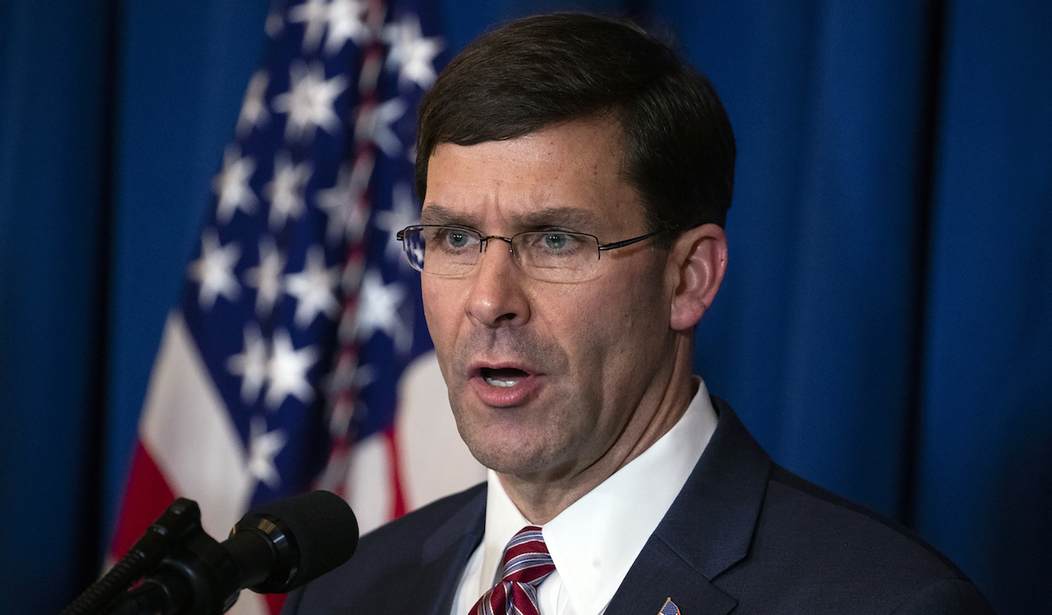Curious indeed. Why will it take a lawsuit for Joe Biden’s Pentagon to allow Mark Esper to dish on Donald Trump?
Former Defense Secretary Mark T. Esper on Sunday sued the agency he once led, accusing officials at the Pentagon of improperly blocking significant portions of an upcoming memoir about his tumultuous tenure under President Donald J. Trump.
The allegations by Mr. Esper, whom Mr. Trump fired shortly after losing his re-election bid last November, are laid out in a lawsuit filed in Federal District Court in Washington, D.C.
“Significant text is being improperly withheld from publication in Secretary Esper’s manuscript under the guise of classification,” the suit said. “The withheld text is crucial to telling important stories discussed in the manuscript.”
And the “important stories” almost certainly pertain mainly to Trump, right? Esper’s mum on what the stories are, but he’s not taking this censorship lying down:
Mr. Esper said in a statement that his goal with the book, titled “A Sacred Oath,” which is expected to be published in May, was to give the public “a full and unvarnished accounting of our nation’s history, especially the more difficult periods.”
He added: “I am more than disappointed the current administration is infringing on my First Amendment constitutional rights. And it is with regret that legal recourse is the only path now available for me to tell my full story to the American people.”
The lawsuit makes it clear that the content being blocked pertains to Esper’s communications with Trump, at least primarily. Esper also complained to Lloyd Austin about attempts to edit his prose, specifically about his choice of “certain verbs or nouns”:
The suit alleges that Esper raised concerns with current Defense Secretary Lloyd Austin, writing in a Nov. 8 email that “some requested redactions asked me to not quote former President Trump and others in meetings, to not describe conversations between the former president and me, and to not use certain verbs or nouns when describing historical events.”
“I was also asked to delete my views on the actions of other countries, on conversations I held with foreign officials, and regarding international events that have been widely reported. Many items were already in the public domain; some were even published by DOD.”
From this description, it sounds as though Esper crossed the executive-privilege line. Presidents have a reasonable expectation that advice on policy remains private unless the presidents want it released. There’s one problem with that, though, which is that Trump doesn’t appear to have made an executive privilege claim in regard to Esper’s memoir, at least not yet. The White House, not the Pentagon, would have to enforce an executive-privilege claim, and it appears the Pentagon stopped the book before it even got to the White House.
So again … why stop Esper from discussing Joe Biden’s favorite distraction? Esper clearly has plenty to say, and presumably little of it will make Trump look good. Esper’s expected to reveal Trump’s desire to use military troops in US cities to put down riots last year, for instance, and perhaps even provide some insight on some of the darker propositions in play surrounding the election. Esper wasn’t around for most of the “stop the steal” campaign, having been fired by a Trump tweet on November 9, 2020, but he’d certainly have had sources within the Pentagon keeping him updated on Trump’s activities. These are precisely the kinds of Trump stories that Biden wants as a focal point while his own job approval ratings struggle to find a floor.
A couple of possibilities come to mind for the Pentagon’s opposition to Esper’s memoir. The most straightforward is that Esper reveals sources and methods, and/or strategic planning, in telling these stories. Esper’s smart enough to avoid that but it doesn’t mean he might not cut it so close as to worry the Pentagon. If that were the case, though, one would expect the Pentagon to make that an explicit reason for blocking publication — and “verbs and nouns” wouldn’t really be the issue.
Another possibility is that Esper might have a few things to say about the debacle in Afghanistan. Esper went along with Trump’s deal with the Taliban but warned in May 2020 that the US shouldn’t stick to a timeline:
“It’s proven not to move as quickly as we’d prefer,” he said on a trip back from Marine Corps Recruit Depot Parris Island, South Carolina, when asked if it could be done in six months. “I don’t put a timeline on it. We have a timeline of May of next year but that timeline was premised on everything moving at a set pace.”
If Esper’s memoir delves deeply into Afghanistan, the plans for withdrawal, and especially what should have been done before a military retreat, then that might be enough for this Pentagon to try and block it. That might be especially true since Biden not only stuck to a timeline — his own, not Trump’s — but ignored the direction in which “everything” was moving for months before that point. Biden’s stunning act of cowardice in abandoning Americans might not look too good in Esper’s telling, even if it’s shown only in comparison.
Even so, SecDef memoirs are hardly the levers on which voters get moved. Remember Robert Gates’ famous assessment of Biden’s foreign-policy competence? That didn’t prevent Biden from winning in 2020, even if it should. Esper’s memoir might not even put a dent in Trump’s 2024 plans regardless of what he has to say. Either the Pentagon is panicking, or Esper really did cross some lines that should have been respected. Stay tuned for the legal fight.








Join the conversation as a VIP Member